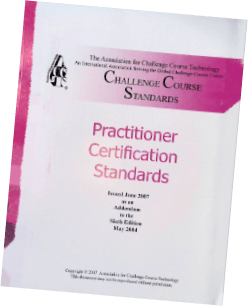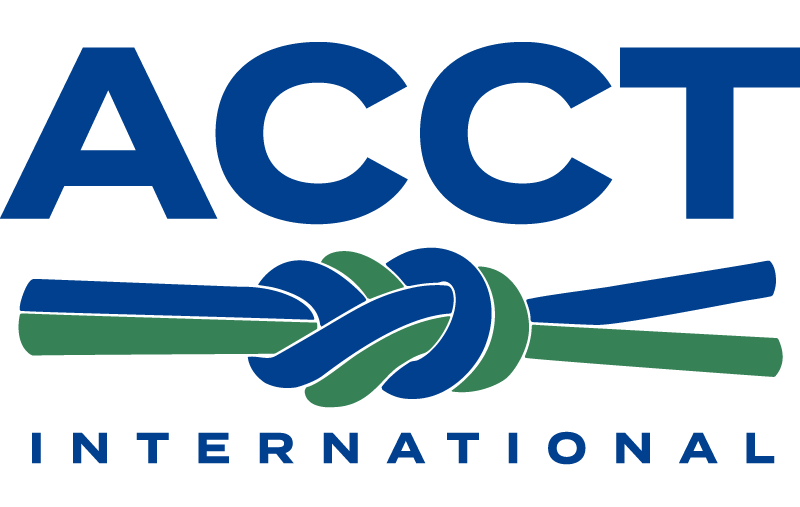Practitioner Certification Standards
Historical Overview and Transition
 Practitioner Certification has been a longstanding topic of discussion within the ACCT International (ACCT) community. The ACCT Practitioner Certification Structure and Requirements (formerly titled the ACCT Practitioner Certification Standards and referred to herein as the “Practitioner Certification Standards”) were initially developed as an ACCT Standard to establish a consistent method for evaluating the competency of challenge course practitioners. The intent was to provide a framework that trainers and organizations could use to assess and document the knowledge, skills, and abilities of their staff.
Practitioner Certification has been a longstanding topic of discussion within the ACCT International (ACCT) community. The ACCT Practitioner Certification Structure and Requirements (formerly titled the ACCT Practitioner Certification Standards and referred to herein as the “Practitioner Certification Standards”) were initially developed as an ACCT Standard to establish a consistent method for evaluating the competency of challenge course practitioners. The intent was to provide a framework that trainers and organizations could use to assess and document the knowledge, skills, and abilities of their staff.
The Practitioner Certification Standards were not intended to serve as an ACCT-administered certification program. Rather, they were designed within the ACCT community as a consensus standard (sometimes referred to as a guideline) to promote uniformity in practitioner evaluations across the industry, offering a recognized, transferable format to support quality assurance and professional development.
The Practitioner Certification Standards were first published as an addendum to the 6th Edition (2007) of the ACCT Challenge Course Standards and were subsequently included in three later editions. ACCT became accredited by the American National Standards Institute (ANSI) in 2006 as a Standards Developing Organization (SDO). When ACCT published the ANSI/ACCT 03-2016), also known as the 9th Edition, the Practitioner Certification Standards chapter was not included in the content that had undergone the procedures to become an American National Standard (ANS). A footnote in the publication clarified that the Practitioner Certification Standards were not part of the ANS, had not undergone public review, and were not required for conformance to the ANS.
Since their introduction, the Practitioner Certification Standards have been widely adopted by ACCT as a foundational program requirement for accrediting vendors under the Professional Vendor Member Program, now known as the Vendor Accreditation Program. Additionally, many training organizations and operations have used the standard as a benchmark for developing and evaluating both in-house and third-party practitioner training and certification programs.
Transition from Standards to Program Oversight
In April 2017, the Standards Development Committee (SDC) informed the Board that the Practitioner Certification Standards were being removed from the standard under development, and the SDC asked the Accreditation and Certification Committee (ACC) to assume editorial responsibility for the document. The ACCT Board of Directors formally confirmed these actions in February 2019.
Since the original publication, the challenge course industry has evolved substantially. Advancements in technology, shifts in training delivery models, and changing program structures have outpaced the framework and requirements of the existing Practitioner Certification Standards. As a result, the document no longer fully reflects current industry practices.
In April 2025, following ongoing discussions about standards alignment, education, and procedural consistency, the ACCT Board of Directors voted to transfer oversight of the Practitioner Certification Standards to the ACCT Program Department for continued use within the Vendor Accreditation Program. On October 29, 2025, the Board of Directors approved a motion to archive the Practitioner Certification Standards.
Current Status and Guidance
The Practitioner Certification Standards document is considered a historical record and is no longer recommended for general industry use. Training programs are encouraged to continue maintaining compliance with the ANSI/ACCT Standards. However, the archived Practitioner Certification Standards will henceforth serve only as a reference for program requirements for vendors accredited through the ACCT Vendor Accreditation Program in the Training and Practitioner Certification service areas. Only ACCT-Accredited Vendors - organizations that have undergone review and approval through the ACCT accreditation process - are authorized to issue Level 1, Level 2, and Course Manager Practitioner Certifications to these requirements.
It is important to note that these credentials are not “ACCT Certifications,” as ACCT is not a certifying body for individual practitioners. ACCT accredits Vendors whose operational protocols and services, such as practitioner certification, are in compliance with ACCT Standards and Program requirements. Practitioners and organizations purchasing training and certification services are strongly advised to verify the accreditation status of a vendor before engaging their services. A list of ACCT Accredited Vendors is available on the ACCT website. ACCT recognizes that there are a multitude of vendor options in our industry; however, ACCT cannot validate the procedures, qualifications, or business practices of non-accredited vendors that do not appear in its directory.
Looking Forward
The archived Practitioner Certification Standards will remain part of ACCT’s historical standards record, representing an important chapter in the association’s standards development history. Content relevant to Vendor Accreditation and Practitioner Certification will continue to be maintained and updated within the Vendor Accreditation resource materials, under the guidance and authority of the Programs Department, as needed.
